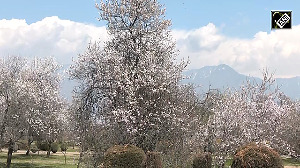Petroleum Minister Ram Naik is likely to meet Finance Minister Jaswant Singh on January 30 to seek excise duty cut on petroleum products in view of excessive volatility in international crude oil prices.
"Crude oil prices have climbed by over $5 a barrel over the levels of June, when the last duty adjustment was done. In keeping with the decision that time, the finance ministry needs to cut excise duty on petrol, diesel and LPG to contain the impact of spurt in international crude oil prices on domestic consumers," highly placed sources said.
The spike in crude oil prices has already seen oil companies raising petrol and diesel prices twice this month and if excise duty is not immediately reduced, more hikes are inevitable, they said.
The impending war in Iraq has added currency to crude oil prices, which are expected to shoot up to $35 a barrel the day US begins its aggression.
"Naik will seek a revenue neutral duty cut," sources said while pointing out that customs revenue from oil imports has gone up substantially following the hike in crude oil prices.
Sources said the petroleum ministry's budget proposal for the next fiscal, including specific excise duty, reduction in customs rates for crude and petroleum products and waiver of duty on capital goods for refinery expansion projects would also figure in the January 30 meeting.
It would also seek maintaining at least 10 per cent difference between import duties on crude and product, they added.
While the Kelkar Committee report on Indirect Taxes had favoured specific excise duty regime, it had recommended that customs duty on crude be brought down to 8 per cent and that on product to 15 per cent in the first phase.
At present, crude oil carries an import duty of 10 per cent while that on petroleum products like petrol and diesel it is 20 per cent.
The petroleum ministry was of the view that a difference of at least 10 per cent between duties on crude and product was needed to give protection to domestic refineries and the Kelkar committee recommendation would reduce their effective rate of protection, sources said.
It would also urge the finance ministry to maintain all subsidised products - domestic cooking gas and kerosene - at the same rate as that of crude to maintain the effective rate of protection for domestic refineries.
Sources said the finance ministry is convinced of the need to do away with the three-tier ad valorem duty structure, which increases the volatility of product prices.
Currently, excise duty on petrol and diesel is 32 and 16 per cent respectively.
With a view to make liquefied natural gas cost competitive with domestic natural gas, the petroleum ministry would seek duty cut on capital goods imported for LNG re-gasification from 35 per cent to 5 per cent, sources said.





 © 2025
© 2025